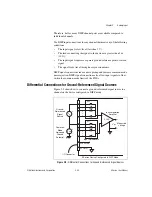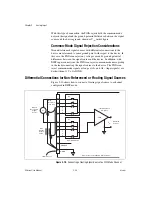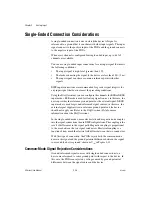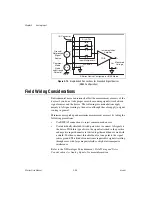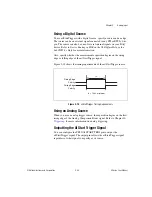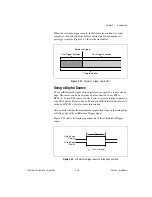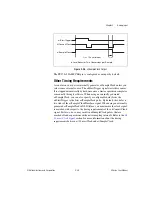
Chapter 2
Analog Input
2-34
ni.com
The output is an active high pulse. Figure 2-20 shows the timing behavior
of the PFI 0/AI START TRIG pin configured as an output.
Figure 2-20.
PFI 0/AI START TRIG Timing Behavior
The PFI 0/AI START TRIG pin is configured as an input by default.
When acquisitions use a start trigger without a reference trigger, they are
posttrigger acquisitions because data is acquired only after the trigger. The
device also uses ai/StartTrigger to initiate pretrigger DAQ operations. In
most pretrigger applications, a software trigger generates ai/StartTrigger.
Refer to the
section
for a complete description
of the use of ai/StartTrigger and ai/ReferenceTrigger in a pretrigger DAQ
operation.
AI Reference Trigger Signal
You can use the AI Reference Trigger (ai/ReferenceTrigger) signal to stop
a measurement acquisition. In Traditional NI-DAQ (Legacy), a reference
trigger is referred to as a stop trigger. To use a reference trigger, specify a
buffer of finite size and a number of pretrigger samples (samples that occur
before the reference trigger). The desired number of posttrigger samples
(samples that occur after the reference trigger) is the buffer size minus the
number of pretrigger samples.
Once the acquisition begins, the DAQ device writes samples to the buffer.
After the DAQ device captures the specified number of pretrigger samples,
the DAQ device begins to look for the reference trigger condition. If the
reference trigger condition occurs before the DAQ device captures the
specified number of pretrigger samples, the DAQ device ignores the
condition.
If the buffer becomes full, the DAQ device continuously discards the oldest
samples in the buffer to make space for the next sample. You can access this
data (with some limitations) before the DAQ device discards it. Refer to
the KnowledgeBase document,
Can a Pretriggered Acquisition be
Continuous?
, for more information.
t
w
t
w
= 50 to 100 ns




